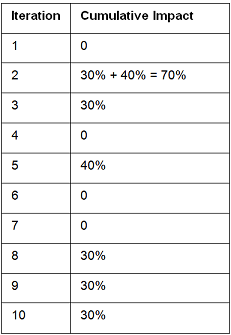About Project Risk Scores and Rankings
Project risk scores represent the level of risk in the project. The project risk
score allows you to compare and rank projects based on their risk exposure.
Project risk scores are shown in the Portfolio Gantt and Project Portfolio
views. RiskyProject calculates three risk scores separately:
- For duration
- For cost
- For non-schedule risk categories
How Cost and Schedule Risk Scores Are Calculated
Project duration score is calculated based on the following formula:

Where:
Duration mean – mean project duration as a result of analysis
Duration original - Original (baseline) project duration with no
risks and uncertainties
- If project does not have duration risks, the Duration score will be equal
1.
- If the Duration risk score is >1, the project has threats related to duration.
- If the Duration risk score is <1,the project has opportunities related to
duration.
Risk scores for duration and cost are color coded:
- Risks scores < 1.5 are shown as green
- Risk scores between 1.5 and 2 are yellow,
- Risk scores > 2 are red.
- Opportunities are always blue.
- Cost scores are calculated similarly.

How Non-Schedule and Cost Risk Scores Are Calculated
Risk scores for non-schedule or cost risks are calculated the following manner:
- For each project and category there is an array for risk results. For example,
if there are two risks “Quality of installation” (probability 50%, impact 30%)
and “Quality of manufacturing” (probability 20%, impact 40%), the array for the
quality category may look like:

- The mean of this array is calculated and multiplied by weight for each
non-schedule risk category
- The sum of values from Step 2 is calculated for the particular project for all
risk categories; this number is absolute non-schedule risk score for the
particular project.
- Absolute non-schedule risk scores for all projects are normalized in such a way
that:
- if a project does not have any risks, the score will = 1
- if a project has opportunities, the score will be < 1
- if a project has
threats, the score will be > 1.
In this way the risk scores for non-schedule
risks will be compatible with risk scores for duration and cost.
See also
About Project Priorities
|

